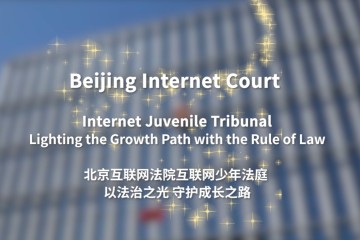Be cautious about what you share online, court says as personal data disputes rise
The Beijing Internet Court has seen a sharp rise in personal information protection cases over the past year, with disputes involving artificial intelligence technology becoming increasingly prominent, officials said on Wednesday.
The court has handled 113 personal data lawsuits since October last year — nearly double the total number of cases from 2018 to last year, which stood at 58, according to data released by the court.
Zhao Ruigang, the court's vice-president, noted this steady increase in data protection disputes, with more than 84 percent of recent cases involving internet companies, particularly in e-commerce, social media and finance. Key data breaches in these cases included names, phone numbers, ID numbers and records related to consumer habits and medical history.
Most plaintiffs pursued legal action after discovering that their personal information had been collected, shared or leaked by internet platforms without their consent, Zhao said.
"We've seen cases where plaintiffs claimed their browsing histories, transaction records and follower lists were compromised or misused," he said, adding that distinguishing what constitutes "personal information" in these cases is a significant legal challenge.
The court has also dealt with disputes centered on emerging AI technologies, such as face-swapping software.
In a case resolved in June, the court fined a face-swapping app provider for misusing the personal data of a popular model who features in videos themed on ancient China. The plaintiff had discovered her likeness was being used without permission as a face-swapping template, which users could use for a fee.
The model, who appeared in traditional Chinese costumes, hairstyles and makeup, argued that the Beijing-based tech company had violated her rights by erasing her face in the app's templates, allowing users to insert their own likeness.
After examining the evidence, including the similarities between the plaintiff's videos and the app's templates, the court ruled that the app had infringed upon her personal information, though it did not violate her facial image rights since her face was erased.
Sun Mingxi, the presiding judge, explained that while the app had removed the plaintiff's facial features without altering or defaming them, it had nonetheless unlawfully collected and used her video content, warranting a fine.
With the rapid advancement of internet technology, Zhao advised internet users to exercise caution when sharing personal data online and encouraged timely deletions for underused accounts. He also urged internet platforms to avoid collecting excessive data unrelated to their services and called on government agencies to increase oversight in data handling, especially as they adapt regulations to emerging tech developments.

 Judicial White Paper
Judicial White Paper
 Play
Play Play
Play Online Lawsuit Guide
Online Lawsuit Guide Beijing Internet Court Lawsuit Service WeChat Account
Beijing Internet Court Lawsuit Service WeChat Account  Beijing Internet Court WeChat Account
Beijing Internet Court WeChat Account